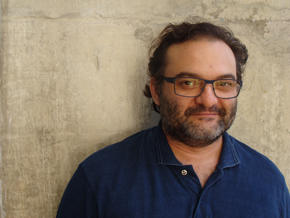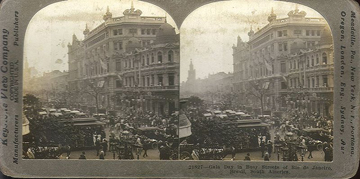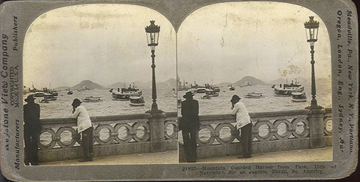The will
by Marcílio França CastroBecause the visit was urgent, I didn’t even finish my lunch hour. Before the clock struck two I was at the door of Otto Mayer’s old, twenty-something-storey building on Rua Tupis. The notary had told me with no uncertainty that we were doing him a favour and not to worry about protocol. “Forget the witnesses, Walter, the formalities. Just take down what he tells you to, and don’t ask any questions.”
As I took the old lift with wooden doors and steel bars, I thought about my life as a clerk. In over twenty years of notarising and authenticating, I couldn’t remember any significant event, no surprise or disaster, no episode that could divide my existence in to a before and an after, as was the case with everyone who made the purchase of a house or acknowledgment of paternity a memorable fact – which it was my job (on behalf of the notary) to certify. In my past I didn’t see (and who will contradict me?) anything worthy of note. With the wall of the lift well sliding past in front of me, every afternoon in the notary’s office suddenly condensed in to a single afternoon – up to the seventeenth floor.
His assistant greeted me at the door to the flat.
“Thank you for coming,” she said. “Make yourself at home. I’ll go get Mr Mayer.”
The flat was modest and tidy, filled with warm light, almost like that of a hospital. The smell of floor varnish gave it a ‘for let’ feel. The furniture was minimal and there were no pictures on the walls. On the only set of bookshelves sat a collection of world literature classics with red covers.
Otto Mayer appeared in a wheelchair pushed by his assistant. Without a word, he held out his shaky hand. In spite of his limitations, he looked sure of himself. His skin was fine and rosy, his white hair slicked back.
The assistant parked the wheelchair and placed a stool beside it, on which she placed a glass with a straw and a handkerchief. She asked me to sit at one end of the sofa, next to the window. The wall of buildings on the other side looked like an extension of the flat, almost within reach. “Excuse me,” she said, tugging the curtain aside a little. The noise of the city centre, muffled by the glass, was a series of discontinuous thuds.
“Let’s do this quickly, lad, before I can’t remember a thing,” he said as soon as we were alone, raising his voice to overcome his hoarseness.
I just sat there for a few minutes, not really knowing what to do. The notary hadn’t given me any instructions, nor had I asked what to do. I opened the old notarial register and stared at Otto’s round face, his bluish, lacklustre pupils.
He slapped the arm of his wheelchair, took a sip of water, and began.
“Without any preamble, my good man. Take this down.”
Number one.
A flight of stairs in an empty building, hazy light coming through the window. All afternoon sitting on the step, waiting for the key.
− I took it down.
Two.
A rainwater tank with a capacity of twenty thousand litres, at the back of the garden.
Three.
An abandoned house on the road to Curvelo. A dog leaning against the wall, watching the car go past. Each time the same dog, which would suddenly lift its leg and pee.
Four.
Dusk at the pipe yard. A man in a suit jacket crosses the yard holding a briefcase, picking his way through the concrete pipes.
“Addendum,” he said, raising his arm.
That was a friend’s dream.
− I recorded it.
“Four,” he continued.
“Five,” I corrected him.
Going into the forest, a clearing in the shade of a rock. The boy opens his bag to see what’s in it: bread, a boiled egg, a piece of cheese and a sausage.
Observation:
Book of adventures.
...
Six.
Moving truck. While the driver argues with the shop owner, a mover snoozes in the back, between a wardrobe and a cooker.
Before finishing his sentences, Otto would close his eyes and crease his eyebrows. Then he’d open his eyes, looking upwards, as if he could see the memory projected on the wall.
“Let’s go, lad, let’s go.”
Seven.
Petrol station. A low stone wall behind the cart, where Marília waited for me one night with cold hands – not really sure about what we were going to do.
Eight.
A roadside auto repair shop, by the edge of a precipice. The red earth, full of cracks, ready to collapse.
Nine.
The dentist’s waiting room. The letters of his name back-to-front on the glass; the swinging door squeaking.
Ten.
At a bus stop, a dark passage behind the toilets. After urinating, a man has difficulty buttoning up his fly – a police officer pulls a gun on him.
It didn’t strike me as very plausible, but I took it down as he’d dictated it.
Eleven.
At the end of Rua B, a barbed-wired fence, easy to climb through. A drainage channel running downhill to the cement. After going around the dressing rooms, the pool. That was the back way into the club.
Twelve.
A small lingerie shop, scalding sun on the pavement. The shop assistant leaning on the counter, waiting.
Thirteen.
A modern house. Light-coloured front, straight angles. Diagonal bars holding up the awning over the porch.
[Two men come out of the house dragging a third by the arms. They get into the police car, which takes off with squealing tyres.]
“Wait a second, my friend,” he said. “The last scene isn’t part of the estate.”
− but I had already written it down.
Fourteen.
Garage in the state housing complex. A car drives in. One of the boys stops the ball rolling…
The sound of tyres on gravel.
Pause.
I turned my head and looked at the building on the other side of the street. A floor of offices, a classroom, a gym. People at the windows on their mobiles, people at the windows smoking. I made notes, and found it all rather pleasant, thinking only vaguely about what he was saying.
Fifteen.
Fifteen?
With the TV on, after dinner. The sofa with its sagging springs, needles and fabric scattered about, a urine stain. That was where the seamstress lived.
“But this memory isn’t mine,” he said in a faltering voice. “It was my wife’s – she repeated it her whole life.”
− I took it down.
A roadside orange stand on Highway BR 381. Colourful bunting tied to the bamboo, flapping.
The distributor’s warehouse. Half-light, dust, invoice pads. That commercial smell – of boxes of medicine. Still air.
Otto had stopped numbering the items, and I had stopped counting them. For a moment, I thought the list would never come to an end. His voice was growing weak. He began to dictate random words, without any connection to one another. He’d interrupt one description and start another. I finished sentences with ellipses and moved on to the next.
“My memory is going blank,” he said.
After a few minutes, he raised his head, gagging somewhat, coughing.
An eroded embankment at the edge of the highway.
Another eroded embankment at the edge of the highway.
That was the last item. The next minute he was chewing on thin air. I glanced towards the kitchen, but couldn’t see his assistant. The noise of rush hour floated up to the window. The flat was beginning to grow dark. In the building opposite, the light was already on in the classroom. We sat there in silence for a time. Otto stared at the wall, while I gazed at the twenty hardcover volumes of great world literature. I identified a Dickens, and another by Flaubert.
His assistant appeared. I closed the register. She smoothed back her employer’s thinning hair.
“Mr Mayer,” she said, shaking his shoulders slightly.
He nodded.
She turned to me.
“I believe you may go now, sir,” she said.
I felt like staying a little longer, reading the list back aloud. I felt a physical wellbeing there – a strange relaxation.
His assistant asked me to see myself out. “And please make sure the notary gets the will,” she added.
Nothing more was explained, nor did I ask.
She turned the wheelchair around and it glided down the corridor.
The next day, I arrived at the office early. I transcribed the list from the register to the computer and printed a copy. I felt like authenticating it. I gave it a seal, then stamped, dated and initialled it. I had to do the job properly, regardless of what it was. The notary signed it, without any idea what it was about. He hadn’t even asked me what had happened at Mr Mayer’s flat. He merely thanked me for my discretion and willingness and said that Otto was a good friend, a brilliant mind in his day. Now the poor man was dealing with dementia. He couldn’t have refused to indulge that little whim of his. “That’s life, my dear Walter,” said the notary, with a matter-of-fact expression. “Today, it’s him. Tomorrow, who knows?” A few weeks later, he told me his friend had died.
That was in October. From then on, the workload at the office, as always, got even bigger. I clocked off at about six in the evening. I spent the days typing deeds, preparing certificates, separating documents to scan (the notary’s office was entering the digital era). I’d arrive home exhausted. To let off steam, before facing the metro, I’d walk to the square in front of the station and stop at a corner lunch bar, where I’d catch the last of the sun. I’d order a beer and a pasty and watch the shops nearby, people coming and going on the pavement. To make the square bigger, the city had expropriated a large plot of land previously covered with shanties of wood and tarpaulin, and it was now bare, fenced off with protective mesh. In front of the lunch bar, the traffic was slow. I’d fill my glass; the cars would inch forward; a dog would appear on the other side of the road. The dog would come and go, circling pedestrians, sniffing the construction works. A bus would go past and it would lift its leg to pee on a lump of concrete. The next evening, the scene would repeat itself. The same dog peeing on the lump of concrete.
I started paying attention to these events. Once, as I was heading down Avenida Amazonas, I came across a moving truck parked across the pavement (the doorman of the building was arguing with the driver). I had a quick glimpse of a man lying in the back, next to a cooker. On another occasion, walking around the square under construction, I saw someone inside the fenced-off area. A man in a suit, holding a briefcase, looking for a short cut through the concrete pipes. Here and there, observing the city, I have discovered stairs, embankments, repair shops, alleys and patrol stations. Nothing is very exact, there are no guarantees. Nevertheless, discretely and without witnesses, I am slowly becoming heir to that will.
Translated from the Portuguese by Alison Entrekin.
 Marcílio França Castro was born in Belo Horizonte in 1967. With a Masters in Literary Studies from the Federal University of Minas Gerais, he is the author of the story collections A casa dos outros (Other People’s Houses, 2009) and Breve cartografia de lugares sem nenhum interesse (Brief Cartography of Places of No Interest, 2011), which was awarded the 2012 Clarice Lispector Prize from the National Library Foundation. Both are published by 7 Letras.
Marcílio França Castro was born in Belo Horizonte in 1967. With a Masters in Literary Studies from the Federal University of Minas Gerais, he is the author of the story collections A casa dos outros (Other People’s Houses, 2009) and Breve cartografia de lugares sem nenhum interesse (Brief Cartography of Places of No Interest, 2011), which was awarded the 2012 Clarice Lispector Prize from the National Library Foundation. Both are published by 7 Letras.
Alison Entrekin’s translations include City of God by Paulo Lins, The Eternal Son by Cristovão Tezza, Near to the Wild Heart by Clarice Lispector, Budapest by Chico Buarque and Crow Blue by Adriana Lisboa.



